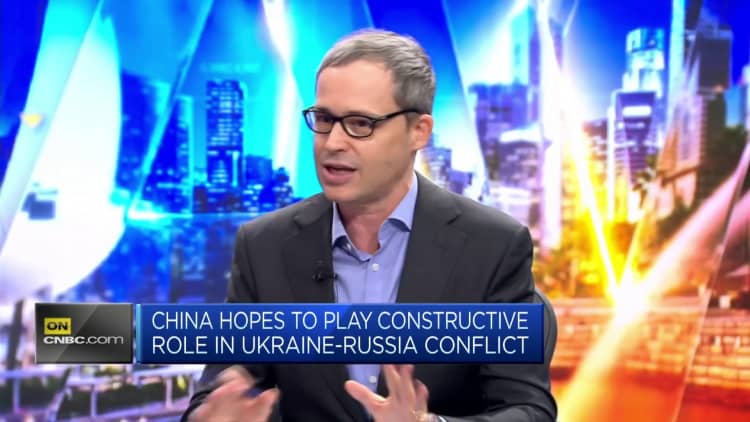Western warnings about the possibility of China sending lethal military aid to Russia are well placed, military analysts told NBC News, as help from Beijing could be a crucial boost for the Kremlin's hopes of battlefield success in the months to come.
China is considering sending Moscow ammunition and artillery, according to U.S. officials, which could be particularly crucial as the war grinds into a second year with the front lines likely to be dominated by brutal artillery duels.
Beijing has accused the United States of "disinformation" over the claims and said Washington should stay out of its relationship with Moscow. But it may be well equipped to support Russia's military should it choose to do so, experts said.
With Russia engaged in a new offensive in the eastern Donbas region, China's existing stockpile of old artillery and ammunition — some of which is Russian made and could be readily used — might give Russia's army the breathing room to keep fighting a war that has already lasted much longer than the Kremlin had planned.
"From the end of the Cold War until approximately the mid-to-late-2000s, China was the most significant foreign customer of Russia's defense industry," said Lukas Fiala, project coordinator of China Foresight, a research program at the London School of Economics. Despite waning reliance on Russian imports and a turn toward home-grown weapons systems, he said, China still has a "sizable contingent of Russian equipment."
More from NBC News:
Bipartisan China committee holds first hearing on 'existential struggle' with Beijing
FBI director accuses China of trying to 'thwart and obfuscate' Covid origin probe
Where Putin's war stands a year after Russia invaded Ukraine
So far, U.S.-supplied long-range weapons like HIMARS artillery have proven to be highly effective on the battlefield, allowing Ukraine to retake large swaths of territory that Russia had annexed by hitting targets well beyond its previous ability, helping to lay the groundwork for sweeping counteroffensives.
The Russian side, too, has been heavily reliant on artillery.
"The Russian army has shown one of the few things it can do is saturate areas with artillery," said Phillips O'Brien, professor of strategic studies at the University of St. Andrews in Scotland, with any new supplies allowing their forces to continue scorching Ukrainian lines.
But that success has come at a heavy cost and may have drained the Kremlin's supplies.
While it was difficult to ascertain the current level of ammunition stocks at Russia's disposal, O'Brien said, "They certainly have used far more than they were originally thinking."
Russia was firing about 20,000 artillery rounds a day, a senior U.S. official told NBC News in November. Even Russia's own mercenary force, the Wagner Group, has accused Moscow of starving them of shells. In November, U.S. officials also said North Korea was covertly supplying Russia with a large number of artillery shells, which, according to experts, suggested Russia was indeed running out.

"All the artillery you have are just empty tubes if you can't fire ammunition from" them, said Frank Ledwidge, senior lecturer of law and strategy at the University of Portsmouth in England.
"We can absolutely guarantee that this would extend the artillery capabilities of Russia into next year at the very least even if they don't give anything else," Ledwidge added.
But "Beijing is stuck in a tricky position," said Fiala.
While China has refrained from condemning the invasion and last week put forward a peace plan that was quickly dismissed by the West, it has so far practiced a careful balancing act.
Russia's victory and stability was ultimately in Chinese interests, Fiala said, but Western sanctions that could be imposed if it did step up its support may make Beijing think twice.
Kyiv will undoubtedly be watching closely, and perhaps renewing its bid for increased support from its own allies, experts said.
The "Ukrainians will probably use it as an argument for their NATO backers to say you've got to get us more, quickly, before the Chinese really start giving the Russians real support," O'Brien said.

